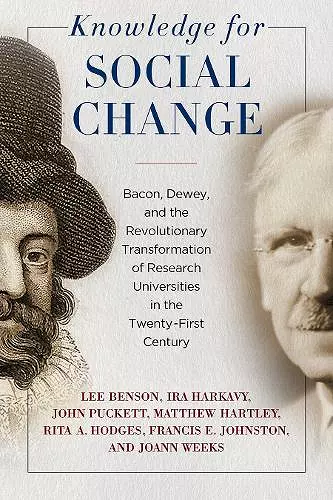Knowledge for Social Change
Bacon, Dewey, and the Revolutionary Transformation of Research Universities in the Twenty-First Century
Lee Benson author Matthew Hartley author Francis E Johnston author John Puckett author Ira Harkavy author Rita A Hodges author Joann Weeks author
Format:Hardback
Publisher:Temple University Press,U.S.
Published:1st Jul '17
Currently unavailable, and unfortunately no date known when it will be back
This hardback is available in another edition too:
- Paperback£11.99(9781439915196)

Employing history, social theory, and a detailed contemporary case study, Knowledge for Social Change argues for fundamentally reshaping research universities to function as democratic, civic, and community-engaged institutions dedicated to advancing learning and knowledge for social change. The authors focus on significant contributions to learning made by Francis Bacon, Benjamin Franklin, Seth Low, Jane Addams, William Rainey Harper, and John Dewey—as well as their own work at Penn’s Netter Center for Community Partnerships—to help create and sustain democratically-engaged colleges and universities for the public good.
Knowledge for Social Change highlights university-assisted community schools to effect a thoroughgoing change of research universities that will contribute to more democratic schools, communities, and societies. The authors also call on democratic-minded academics to create and sustain a global movement dedicated to advancing learning for the “relief of man’s estate”—an iconic phrase by Francis Bacon that emphasized the continued betterment of the human condition—and to realize Dewey’s vision of an organic “Great Community” composed of participatory, democratic, collaborative, and interdependent societies.
"The authors catalogue in rich detail the pioneering efforts of educators and administrators at the University of Pennsylvania to put into practice the ideals of their forebears in progressive education, John Dewey first and foremost among them. Until the Netter Center, these ideals had fallen largely on deaf ears or been transformed beyond recognition. It is this faithfulness to the inseparability of past, present, and future that makes the book a standout in the literature of education and societal change, putting the public back in public education and recalling universities to their special responsibilities here."— Teachers College Record
"(T)he book is fundamental reading for those interested in this subject matter and should be considered complementary to analogous efforts by engaged scholars operating in other geographic and cultural contexts.... Overall, the book is an honest and in-depth account of the real possibility for a prestigious research university to achieve excellence in research and teaching through an engaged agenda, and it offers a number of intellectual stimuli and practical hints in this direction."— Planning Theory and Practice
"This book is a must-read for those of us responsible for educating students who will become our future world leaders. Knowledge for Social Change proposes that research universities become radically transformed to function as democratic, civic, and community-engaged institutions, and I could not agree with the idea more." —Eduardo J. Padrón, President, Miami Dade College
"Knowledge for Social Change offers a bold vision for democratically minded academics concerned about our nation's future.... The authors, who are among the stalwarts of the modern community engagement movement, make no secret that the book's intellectual and political projects are meant to be provocative. Some readers may greet their provocations as utopian wishful thinking, but the authors make clear that their vision is serious and practical. Their earnestness and commitment to the transformation of research universities should prompt even the most skeptical reader to consider the radical project they propose.... The book represents a seminal scholarly contribution to the modern-day community engagement movement as the most comprehensive account to date of the philosophical ideas that ground it."—Journal of Higher Education and Outreach
"Benson and colleagues’ [argue] that education, not the economic system, is the foundation stone of human society.... The authors of Knowledge for Social Change have an impressive academic pedigree for mounting their argument.... From their collective societal and educational vantage point, they place responsibility for social change squarely on the shoulders of research universities – citing William Rainey Harper’s conviction that democracy relies on educated citizens and that universities are the driver of education, as they produce both the teachers, and the teachers of the teachers. Thus, the crux of the argument is that the kind of education individuals receive determines human capacity for progress and social change. Supporting that vision, the authors draw from an array of theorists and activists whose research and educational vision was deeply occupational."—Journal of Occupational Science
"Individually and collectively, the [authors] have made important contributions to the literature on higher education prior to this collaboration. And they have done a remarkable job of producing a collective work of clarity and coherence that comes across as a single voice and avoids repetition. It is a book that should be widely read by engaged scholars, practitioners, administrative leaders, and students of engagement."—Michigan Journal of Community Service Learning
"[The authors] successfully advocate for a transformative system of higher education that implicates the community and public schools in the process of learning, knowledge production, and civic-engagement.... [They] provide compelling, optimistic solutions—and paths forward—to remedy the growing corporatization of the research university and service-learning.... [O]verall, and perhaps most significantly, Benson and his team provide a meaningful, tangible adaptation to Dewey’s ideas regarding education and reveal that partnerships between universities and communities can create a more democratically engaged citizenry that works collectively for the good of all."—Partnerships: A Journal of Service-Learning and Civic Engagement
ISBN: 9781439915189
Dimensions: 229mm x 152mm x 20mm
Weight: unknown
206 pages